 Jamie McGovern Jamie McGovern CWU ASR & MHFA Tutor and Mental Health Ambassador RMG, highlights the work of a 'Painting Postie' Tony Dunbar a CWU member in the Grter Mersey Amal Branch, and discusses how art can be used to improve mental health:
Jamie McGovern Jamie McGovern CWU ASR & MHFA Tutor and Mental Health Ambassador RMG, highlights the work of a 'Painting Postie' Tony Dunbar a CWU member in the Grter Mersey Amal Branch, and discusses how art can be used to improve mental health:
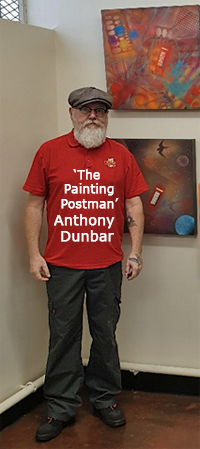 Tony Dunbar is a OPG at Speke Delivery Office in Liverpool, he has been bringing his art into the workplace with the total blessing of his colleagues, his manager and his union.
Tony Dunbar is a OPG at Speke Delivery Office in Liverpool, he has been bringing his art into the workplace with the total blessing of his colleagues, his manager and his union.
Being able to do this and express his thoughts (In Art format) offers a coping mechanism which acts a type of self-care.
In promoting Tony's art and the concept of how art can help improve the mental health of those suffering from an illness which can be debilitating and even cost lives, Jamie said of Anthony's work:
"As a MHFA Tutor it is my belief that Sharing ‘lived in experiences’ is massively important for both the reader and the author, We learn so much from the ‘descriptive word’.
The author also often describes the cathartic experience this can bring without actually realising (although hoping) that to the reader it offers so much value.
Having the chance to meet and talk with Anthony was of huge benefit to me as we learn so much from our colleagues which in turn helps shape support we offer as a trade union.
Anthony has now not only written his first blog He will be speaking to regional colleagues about the benefits of ‘guided conversations’ This is how I first met Anthony and simply through the art of conversation (with Anthony & his colleagues) you realise that not only is he an Remarkable artist, he is also an Remarkable person too."
Tony's own personal blog can be read later in this article, and local CWU Rep Jay Ward at Speke D.O reaction to Tony's art at place in her Delivery Office.
But first, Jamie writes about how art can be used to improve the mental health of the one in four of us who will suffer from stress, anxiety, depression and other forms of mental health illness at some point in our lives. Tony's paintings shown in their positioning in Royal Mail's Speke Delivery Office, are reproduced with his permission:
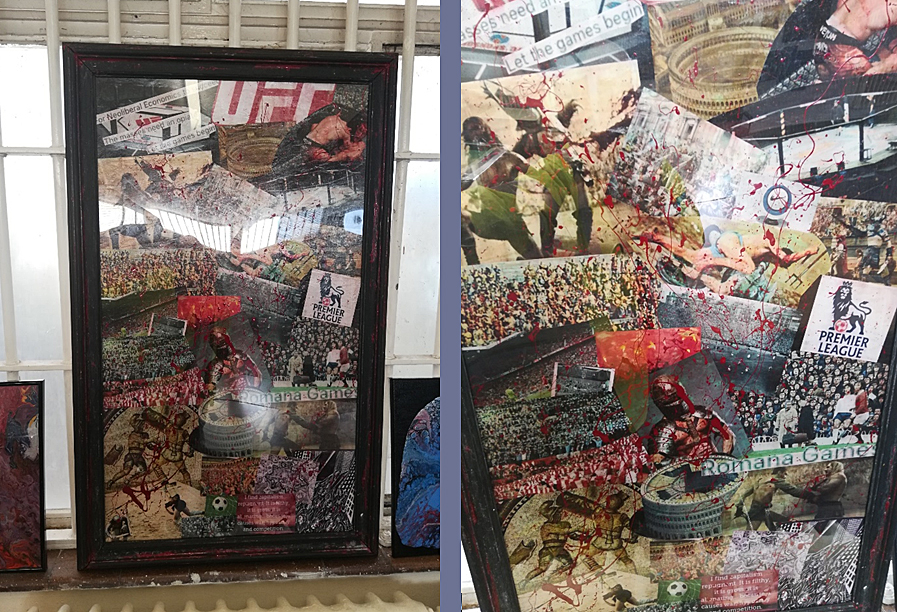
Being engaged in the Art
Do you recognise a feeling of joy that you can get when taking part in cultural activities such as music, museums, dance groups and theatre?
Getting involved with the arts can have powerful and lasting effects on health. It can help to protect against a range of mental health conditions, help manage mental ill health and support recovery.
Since it can be used as a non-medical approach to preventing mental health problems it could help save money in the health service and social care.
Making art can enable people to take greater responsibility of their own health and wellbeing by helping maintain levels of independency and curiosity and improve the quality of life by bringing greater joy.
What role does art play in creative therapy?
Art can be a creative therapy, simply by using arts-based activities in a therapeutic environment, with the support colleagues or of a trained professional.
You don't need to have done any Arts activities before, or have any particular skills or knowledge.
Different people will have different experiences of arts and creative therapies, but what art therapy can do is:
- give you a safe time and place where you can separate yourself to a good feeling moment
- help you make sense of things and understand yourself better
- help you resolve complicated feelings, or find ways to live with them
- help you communicate and express yourself, which might include feelings or experiences you find hard to put into words.
- Art can make a difference to others too.

The benefit to others can be seen from this panoramic picture
This is the canteen area at Speke delivery office, it was previously a drab, uninviting space. Staff would often prefer to spend time away from the canteen due to the prison like appearance of the security bars on the windows and stark blank walls.
Now it has been transformed into a welcoming space filled with Tony’s excellent art which offers a real connection with the viewer into his emotions in art form.
Staff are now more likely to take necessary breaks away from workstations and the element of inclusivity this area brings makes this a naturally warm & inviting space.
According to the charity MIND- Research suggests that arts and creative therapies may help with mental health problems. Some people say they find these sorts of therapies helpful because they provide ways of addressing painful feelings and difficult experiences without talking about them which can sometimes include experiences of trauma. Guidelines from the National Institute for Health and Care Excellence (NICE) recommend that arts therapies are considered for everyone who has psychosis or schizophrenia, which includes related conditions such as schizoaffective disorder.
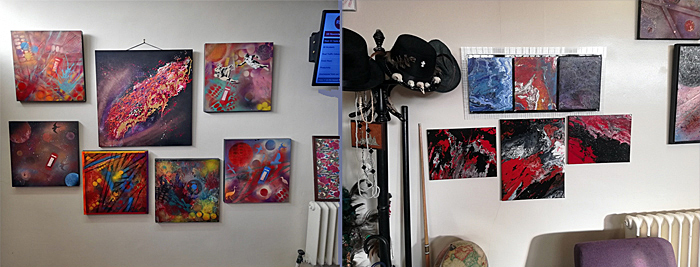
Tony's local CWU Rep Jay Ward at Speke D.O. comments on Tony's art installation in their break room, and how it has affected her:
"Since Tony has put his art work in our break area room it has totally transformed it from a blank cold harsh room into a warm inviting place, where you can enjoy your break and admire his wonderful Art.
The security bars which hang covering the windows are no longer visible, not because they are covered in art work, it's because your eyes are drawn to Tony's work.
Each time you look at the art you always see something you haven't seen before. Tony has really made his mark in our break room area and I for one hope he keeps adding to it, he has done a great job in brightening up all our days through his own Amazing work which he has kindly shared."
As mentioned previously, Tony has written his first blog. In it he discusses what he calls 'his own personal depression' and how he copes on a daily basis. Many of us can entirely relate to his experience:
This is a very difficult Blog to write. For most of my life depression was the illness that had to be hidden. You see I am a child of the seventies the decade of sexism, racism glamrockism in fact all the isms and to cap it off seriously flared jeans.
I guess it was as always had been a decade of the British stiff upper lip,when men were still considered the main bread earner finished work and spent the evening drinking pints with whiskey chasers stood their ground supported the team their fathers and fathers father had supported took their wives out on a saturday night to the local social club were they would laugh along to racist and homophobic comedians,sing and dance, then end the night with a good old fashion punchup.
Nobody spoke about Mental health and it was not the thing for men to do. Depression would have been considered a sign of weakness and unmanly. So for years I hid my depression and hiding and not talking only made things worse .As Bob Dylan said “ the times they are a changin’ ”.
My Personal Depression
I call it personal because I believe it is unique to me.Just as we all have our own DNA, Fingerprints etc each individual who suffers with depressive symptoms will have similarities but there will be distinct differences. Probably why people react differently to medication or therapy. My depression is indiscriminate. It doesn't have a certain time or day to strike so I don't really know when it will overwhelm me.
I use a rating system of how I feel mentally on a daily basis ratings 1 to 10
My first thought on waking is where I am on the scale.
Stages
10 - Suicidal and will act upon it. Thankfully I have never gotten here. I Have what I Call my anchors to this world.
First my children I know I Would destroy their lives if I ever acted on the immense dark thoughts that can in a depressive episode play on my mind. My parents gave me a simple sad but true quote: I bury them they don't want to have to bury me. My Wife who doesn't have any depression but suffers along with me, she already pays a price.
7,8,9 - If I am here there are constant thoughts of suicide, thoughts that the people around me would be better off without me.
In this stage normal life ceases.
You don't get out of bed no bathing, no eating, no drinking you cant even brush your teeth. Life stops no interest in anything you're in an absolute pit of dark despair.
My mind will keep harping back to mistakes I have made in my life and I will condemn myself as a total waste. Life has no meaning there is no point to existence. You cannot work or function in this phase.
This stage can descend on me at any time. I can be looking forward to a night out, be it a meal with my Family or a pint with friends only to find myself disengaging and falling into a depressive mode and not wanting to be there.
The times I have spent walking around Restaurant /pub car parks trying to talk myself into continuing with the evening and failing or over drinking alcohol to try and keep the darkness at bay.
Writing this scares me knowing I could be back here.
6 - Is a phase where I spend a lot of time.
This is the battling stage and probably the hardest to describe. Its like you are in a tunnel but you are close to the light at the end and this is were the techniques I have learnt over the years come into play be it meditation, CBT.
The important thing here is the support of family your colleagues and Management to allow a bit of flexibility vis-à-vis start times of shifts end times because I will be slower, possibly a bit foggy and sluggish and I will be battling with myself i.e. get out of bed, bathe, one foot in front of the other, it's not easy in fact it's very difficult.
4,5 - Normality This is the phase where hopefully all the constant and daily work on my mind gets me to and hopefully will on a more permanent basis.
This phase is where I can get up in the morning and engage with life with a relative degree of normality. I Get to work, laugh and joke with colleagues and at home I'm interested in my family and not so wrapped up in myself. Depression is such a selfish illness.
The things that help
Meditation and mindfulness:
I find a simple 20 minutes or so of this seems to help being in the now, no dwelling on the past and no dreading the future. To this end I have helped create a quiet room in work where I and my colleagues can go and chill,meditate, contemplate etc.
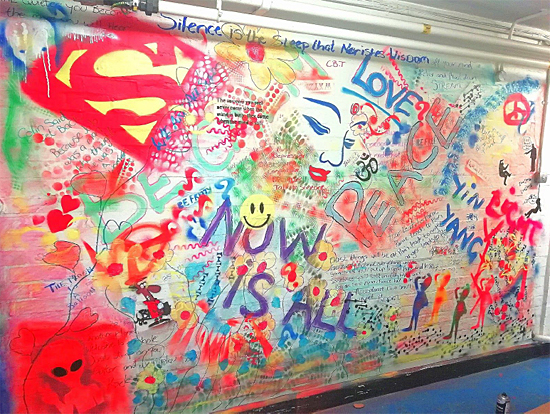
I am an artist. Art is a form of meditation to me. I can get lost in art.
I'm not in this world
when painting, it's just me and a canvas or wall and colour and something happens
sometimes good sometimes well?
Over the past year I have with my office manager, Tina’s
permission, been bringing my art into the office canteen where I have set up a gallery again
this has helped with my mental well being.
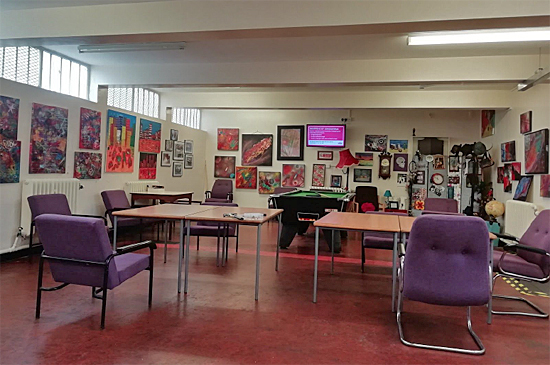
Talking and openness:
The most important of all is coming to terms with and talking about depression.
This is something I have learned as I said at the beginning of this blog I am a child of the 70s where being open about depression meant you were less of a man but thousands of lost lives will testify that this is just plane nonsense.
We are 50 years on. There is plenty of help out there and people will now listen and understand.
Anthony Dunbar
Postie: Speke Delivery office
You can download Tony's Blog in it's original PDF format here
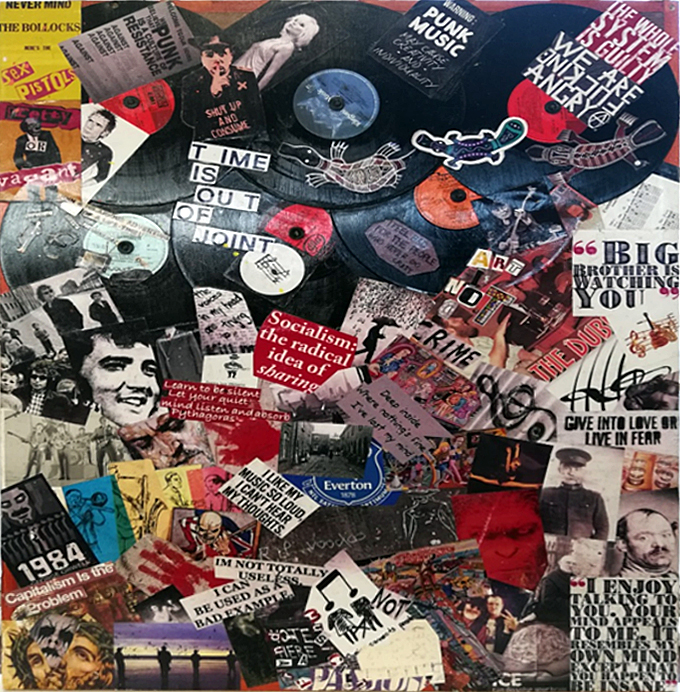
Tony’s art collection can be viewed at Royal mail, Speke Delivery Office L24. Prior site permission may be needed
Document & Photo’s shared with Unionsafety with consent of Anthony Dunbar


 Jamie McGovern Jamie McGovern CWU ASR & MHFA Tutor and Mental Health Ambassador RMG, highlights the work of a 'Painting Postie' Tony Dunbar a CWU member in the Grter Mersey Amal Branch, and discusses how art can be used to improve mental health:
Jamie McGovern Jamie McGovern CWU ASR & MHFA Tutor and Mental Health Ambassador RMG, highlights the work of a 'Painting Postie' Tony Dunbar a CWU member in the Grter Mersey Amal Branch, and discusses how art can be used to improve mental health:  Tony Dunbar is a OPG at Speke Delivery Office in Liverpool, he has been bringing his art into the workplace with the total blessing of his colleagues, his manager and his union.
Tony Dunbar is a OPG at Speke Delivery Office in Liverpool, he has been bringing his art into the workplace with the total blessing of his colleagues, his manager and his union.





